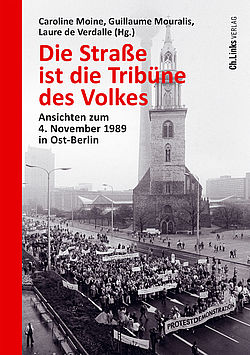Assistant Professor in Contemporary History Caroline Moine | Associated Researcher
Former Member
Home Institution
:
Université Paris-Saclay/Université Versailles Saint-Quentin-en-Yvelines
|
Position
:
Assistant Professor
|
Disciplines
:
History
|
former
Department
:
Institut d'études culturelles (IEC)
Biography
A former student of the ENS Ulm, Caroline Moine has been an assistant professor in contemporary history at the Université Paris-Saclay/Université Versailles Saint-Quentin-en-Yvelines since 2006, and a full member of the Centre d'histoire culturelle des sociétés contemporaines, which she co-directed from 2014 to 2018.
She is a member of the editorial board of the journal Le Temps des Médias. Une revue d'histoire and co-founder of the new Franco-German review Symposium Culture@Kultur.
She has co-organized film screenings in France (around DEFA films at the ENS, the Cinémathèque française and the Maison Heinrich-Heine) and in Germany (Institut français de Berlin). She is a member of the jury for the documentary film project prize of the Rendez-vous de l'histoire de Blois.
Researchtopic
A specialist in the history of international cultural relations during the Cold War, she is particularly interested in the role of the two Germanys in the circulations between East and West, North and South.
Two themes are at the heart of his current research:
- cinema and the Cold War, in particular through the history of international film festivals in Europe;
- the international solidarity movements, such as the European mobilisations against the Chilean dictatorship following the coup d'état of 11 September 1973.
International solidarity mobilizations with Chile after the coup d'état of 11 September 1973. Transnational political, cultural and religious dynamics.
Die Straße ist die Tribüne des Volkes
October 01, 2021Caroline Moine , Guillaume Mouralis , Laure de Verdalle
Forschungen zur DDR-Gesellschaft
Edition: Ch.Links Verlag
Collection: Forschungen zur DDR-Gesellschaft
ISBN: 978-3-96289-133-6
Caroline Moine, Guillaume Mouralis, Laure de Verdalle (dir.)
Berlin, Ch. Links Verlag
Date de parution : 25 octobre 2021
ISBN : 9978-3-96289-133-6
248 pages
25 €
Der 4. November 1989 ist ein Höhepunkt der Friedlichen Revolution. Dennoch wird dieser Tag im Rückblick oft übersehen. Sein großer Bruder - der Tag des Mauerfalls - steht im Rampenlicht. Dabei ging es auf der Kundgebung rund um den Berliner Alexanderplatz, »der größten in der deutschen Geschichte«, wie der Spiegel damals schrieb, gar nicht um die Öffnung der Mauer. Die erste genehmigte nichtstaatliche Demonstration in der DDR stand vielmehr im Zeichen der gesellschaftlichen Erneuerung. Prominente auf der Bühne und Zehntausende auf der Straße forderten: Die DDR sollte sich verändern. Eine Utopie, wie sich herausstellte. »Utopia 89« - so heißt auch das Projekt, das diesem Sammelband zugrunde liegt. Er macht den 4. November 1989 erstmals zum zentralen Gegenstand der zeithistorischen Betrachtung. Aus unterschiedlichen Perspektiven werden die vielfältigen, teils widersprüchlichen Dynamiken vor, während und nach der Großdemonstration beleuchtet. Warum konnte die Utopie keine Wirklichkeit werden? Darauf geben französische und deutsche Expert:innen aus Wissenschaft, Kunst, Politik sowie wichtige Zeitzeug:innen fundierte Antworten.
"La rue est la tribune du peuple." Regards croisés sur le 4 novembre 1989 à Berlin-Est
Le 4 novembre 1989 est un des temps forts de la "Révolution pacifique" en RDA, souvent éclipsé par la chute du mur de Berlin, qui intervient à peine quelques jours plus tard. Pourtant, dans ce qui reste, selon la presse de l'époque, l'un des plus grands rassemblements de l'histoire allemande, les manifestant.e.s ne réclament ni l'ouverture du mur, ni la réunification des deux Allemagnes. Ils/elles revendiquent bien davantage un renouveau socialiste et une démocratisation du régime est-allemand. Les personnalités du monde artistique et politique est-allemand qui se succèdent à la tribune lors du meeting qui clôt la journée semblent partager, avec les manifestant.e.s, un horizon d'attente qui peut apparaître aujourd'hui comme utopique. "Utopia '89" est également le nom du projet collectif, théâtral et scientifique, à l'origine de ce volume, qui associe chercheur.euses français·es et allemand·es (historien·es, politistes, sociologues), mais aussi artistes et témoins, pour éclairer les dynamiques en partie contradictoires de l'événement et mieux saisir les enjeux d'une mémoire souvent conflictuelle du 4 novembre 1989.
Publications
Monographs
-Caroline Moine, Screened Encouters. The Leipzig Documentary Film Festival, 1955-1990, New York, Berghahn Books, 2018.
-Caroline Moine, Cinéma et guerre froide : Histoire du festival de films documentaires de Leipzig (1955-1990),Paris, Publications de la Sorbonne, 2014.
Collective books and special issue
- Christian Delporte, C. Moine (eds.), Culture, médias, pouvoirs aux Etats-Unis et en Europe occidentale, 1945-1991, Paris, Armand Colin, 2018.
-Frank Bösch, C. Moine, Stefanie Senger (eds.), Internationale Solidarität. Globales Engagement in der Bundesrepublik und der DDR, Göttingen, Wallstein Verlag, 2018.
-Andreas Kötzing, C. Moine (eds.), Cultural Transfer and Political Conflicts. Film Festivals in the Cold War, Göttingen, Vandenhoeck&Ruprecht, 2017.
-Olivier Compagnon, C. Moine (eds.), Chili 1973, un événement mondial, Monde(s), n°8, Rennes, novembre 2015.
Publications in PDF format